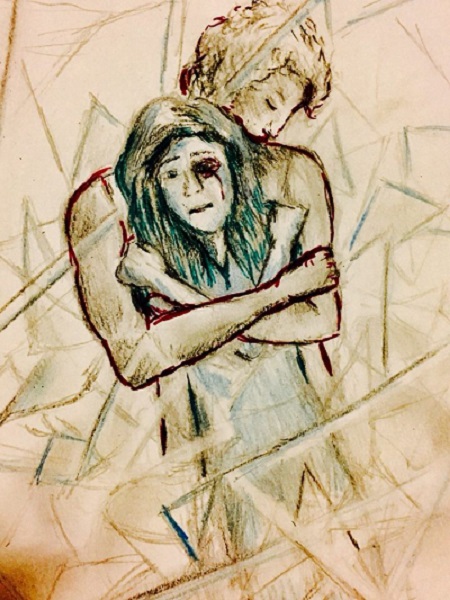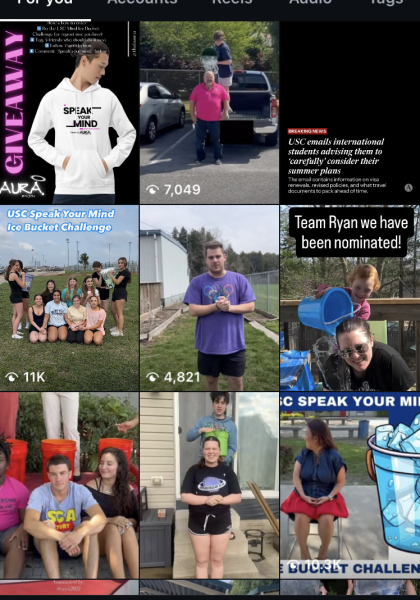It’s not okay.

According to RAIN, the nation’s largest anti sexual violence organization, every 98 seconds another innocent individual becomes a victim of sexual assault, a pace so rapid its almost unfathomable.
“It’ll get better” It does get better, but a profound variation of that same pain still lingers, a mental scar that never completely fades away. “It’s not a big deal” Wrong. It’s an objectifying and illegal act of absolute disregard for the well being of another individual.“That’s what happens when you drink” No, that’s not what happens, the alcohol wasn’t my assailant, they were. “Hey, lesson learned” I didn’t learn a lesson, I learned to feel disgusted with my own body, to feel trapped inside my own skin. “Ya’ll were just being stupid”. How can you be stupid when you’re barely conscious?
Sexual assault is defined as “any type of forced or coerced sexual contact or behavior that happens without consent”. It’s not that I didn’t know it happened, I just assumed I was the exception, that it only happened to those beautiful girls with sad eyes they showed on the news. Despite the warnings, the catchphrases my mom loved to shout as I walked out the door, “be smart”, “stay together”, there was nothing I could have done to prepare myself. Nothing I could have done to ready myself for the fragmented memories that would taint my mind for days on end. No trick I could have mastered to escape how I felt the next morning, waking up on my own couch, in my own basement, in my own skin, but feeling like a stranger to absolutely everything. I’ve wanted to scream out of anger before but this time, the desire bubbled up from deep within me, not out of anger, but of pure shame. They had taken a part of me that I didn’t want to give, taken a memory that I couldn’t recall, and the only thing I had contributed was a weak “help”.
I was sexually assaulted. Any level of intoxication doesn’t change that. Sexual contact is legally considered to be assault when one individual involved is not capable or does not consent to the on-goings. When an individual is drunk they are not legally nor morally capable of giving this required consent. Research indicates that about half of sexual assault victims have been drinking, but drinking does not cause the assault itself. Sexual assault perpetrators often deliberately utilize alcohol in order to take advantage of someone. Regardless if both parties are under the influence, the party to blame is that which advanced the situation towards that of a sexual manner despite how incoherent the other party is. So, me, a drunk girl laying barely conscious on the basement floor, was not capable of giving consent. Me, a drunk girl, meekly calling for help, did not give consent simply because others in the room did not hear me. My consent was not given. It was disregarded, unimportant.
Just as the amount of alcohol a victim drinks doesn’t make them at fault, neither does a multitude of other factors. Dressing in a provocative way does not cause sexual assault. Nobody “asks for it” when they walk out of the door in revealing clothing. According to research only 4.4 percent of all reported rape cases involved “provocative behavior” from the victim, a lower percentage than that of even murder, which is 22 percent. This same study also proved that the majority of rapists didn’t even remember what their victim was wearing. Even more, 1 in 3 college men said that they would force a girl to have sex with them if they could legally pull it off. That has nothing to do with clothing. There is no law banning a particular type of clothing, but there is a law making sexual assault a crime. There is no reason somebody should have to fear for their both mental and physical safety simply due to their choice in clothing.
Just as it’s not a victim’s fault for their attire, it’s not their fault if they react in an unusual and less dramatic way. “Freezing” is an exceptionally common reaction during sexual assault. A victim will often both physically and mentally shut down, making it nearly impossible to move, speak, or think. Freezing up, better labeled as withdrawing, is a common reaction to a high stress and fear- filled situation. A psychology professor, Dr. Martin Antony, claimed that “Freezing “is actually a common response to a threat that we see in mammals, in fact, not just humans”. This action of freezing causes an inability to speak or think. It’s designed to protect an individual from a situation where a reaction could be impulsive or cause further harm.
Regardless of the situation, the psychological and physical effects of sexual assault remain traumatic. These effects go far beyond any physical complications, though there are a range of those including bruising, bleeding, STDS, and even possible pregnancy. Survivors typically suffer from severe shame, convinced that they are permanently flawed following the assault. Guilt racks their brain, a perception that it was somehow their fault. Denial follows, with the victims claiming “it wasn’t that bad”. A general state of mistrust develops along with a feeling of constant danger, finding it difficult to develop close relationships. To make matters worse, a majority of survivors are plagued with detailed nightmares of their assault. Whereas these are short term affects, others can last a lifetime. These include unhealthy coping mechanisms, anxiety, depression, mood swings, PTSD, flashbacks, paranoia, suicidal thoughts, isolation, and many others. All of these can lead to related issues such as eating disorders, substance abuse, self harm, and a variety of physical changes.
Fortunately, there are always resources for a victim to receive help. They can call 800.656.HOPE (4673), a national sexual assault hotline, in order to be connected with a staff member from a sexual assault provider in their area. This service offers confidential support, assistance in finding a local program that offers more personalized support, an individual to talk through the events that occurred, information about sexual assault laws, and general information about medical concerns following the assault. Another available hotline is 212-227-3000, which provides a variety of help regarding rape and sexual assault.
An alternative to calling a hotline is to utilize a four step process aimed to assist sexual assault victims. Step 1 is to address what happened. This includes reaching out to someone you trust in order to discuss the occurrence, reclaiming a sense of control in life, and assigning the blame solely on the rapist/assailant. Step 2 is to prepare for the aftermath of the assault. This incorporates several mental tools that can contribute to the prevention of stress associated with flashbacks and triggers; such as breathing practices. Step 3 is reconnecting to your own body and feelings, as your body often shuts down following an event of this nature to disconnect from any form of pain. This can lead to risky behaviors and drug as a ploy to feel something again. Reconnection can be accomplished through meditation, yoga, and other activities. Step 4 is to continue to nurture oneself, as the healing process doesn’t happen overnight. This involves staying connected to friends and family, becoming social again, taking time to rest your body, avoiding alcohol and drugs, and more.
Just as sexual assault isn’t acceptable, neither is sexual harassment, defined as “unwelcome words and actions by unknown persons in public places which are motivated by gender and invade a person’s physical and emotional space in a disrespectful, creepy, startling, scary, or insulting way”. It has become perfectly acceptable for individuals to be both manhandled and cat called. It’s a degrading part of modern day culture where actions such as these are to be not only expected but also accepted. The devastating reality is that this puts the majority of our population at risk for life altering mental health issues, as sexual harassment and objectification are associated with an increase in depression, social isolation, shame, and even the impairment of cognitive functions. As a senior in high school I have had my own personal journey of sexual harassment, as I’m sure most girls have. My story began way back in 6th grade and to this day continues to be written, page after page full of crude remarks and the occasional unwanted groping. I know I’m not unique, just one of many who repeatedly falls victim to the idea that this okay, that “boys will be boys”. One of many who has allowed herself to be seen as just a body, an object, rather than a human being. I wish, looking back, I could have been my own support system, could have opened up my mouth and spoke up each time I felt degraded, but I didn’t. The only thing to do now is move forward and promote the idea that neither sexual harassment nor sexual assault, is in fact, not okay.
Your donation will help support The Lambert Post, Lambert High Schools student-run newspaper! Your contribution will allow us to purchase equipment and cover website hosting costs.













Carri Vanderzanden • Dec 7, 2017 at 12:58 pm
Cayla Vanderzanden, you are very brave for tackling this issue and providing your own personal perspective and story.. It needs to be talked about! Every day. To everyone! Boys, girls, men, women. I commend you, and I’m ridiculously proud of you.